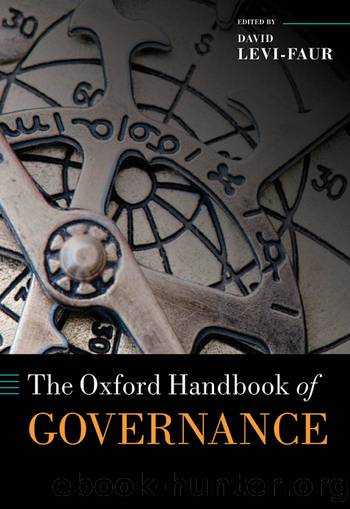The Oxford Handbook of Governance by David Levi-Faur;

Author:David Levi-Faur;
Language: eng
Format: epub
Publisher: OUP Premium
Published: 2012-06-15T00:00:00+00:00
2. CORPORATE GOVERNANCE: FROM SHAREHOLDER VALUE TO SOCIAL RESPONSIBILITY?
Ownership concerns have been critical in corporate governance research in the United States right from the very beginning. Adolf Berle and Gardiner Means (1967 [1932]) were early in pointing out problems arising from the separation of (dispersed stock) ownership and control in their book The Modern Corporation and Private Property. Joseph Schumpeter (1962 [1942]) later would go further in forecasting the demise of capitalism due to the decline of family-owned corporations in his famous Capitalism, Socialism and Democracy. But Berle and Means had already vividly described the dangers of corporate oligarchy coupled with plundering by managers. According to their account, scattered owners had no voice option in the United States and could therefore only exit, that is, sell their shares, in order to express dissent. In a nutshell, the major concern of the âprincipal agentâ (here: owner/manager) theory already laid out at this stage occupies economic neo-institutionalism to this day (Miller 2005).
More technically, the mainstream of corporate governance research is grounded in the original work of Ronald Coase (1937), who was the first to theorize firms (hierarchy) as an alternative to unconstrained market relations reliant on contracts between individuals. His contribution was crucial in alerting the neoclassical mainstream in economics, which had strongly rejected the historical school because of its alleged lack of theory, to reconsider the importance of nonmarket relations in economics. Coaseâs rational choice explanation of the reality and economic rationality of firms paved the way for comparative research on corporate governance. His work was crucial in establishing the role of organizations as either additionally or as a potential alternative to market relations.
Organizations have been found to reduce the burden and cost of transactions and thus provide agents with options to choose between different modes of coordination or governance. Following Coase, Oliver Williamson (1985) generalized the transaction cost approach, which along with principalâagent and property rights theories constitutes the basis for the larger neo-institutional research programs of law and economics (Klein 1998). Economic neo-institutionalists generally aim to examine alternative and complementary modes of economic governance in principle (e.g. market, network, and hierarchy), which have formed the basis of intense discussions, mainly among economists, to inform competition policy and corporate governance arrangements. More recently, scholars have started to investigate hybrid forms and combinations as well, in recognition of the exercise of authority in the absence of organizational hierarchies in public-private partnerships, for example (Ménard 2004). The comparative approach of the new generation of institutional economists is quite peculiar, however, driven by universal a priori abstractions rather than by insights derived from temporal and societal diversity. Historically, contingent ownership concerns are thereby turned into apparently universal shareholder concerns.
In a two-step procedure, neo-institutional economists first conduct a positive analysis of the reality perceived to point to (in)efficiencies that are considered to be due to institutional incentives (not) conducive to market transactions based on rational choice axioms. The second step constitutes a normative analysis of how to change the institutional configuration in order to achieve greater efficiency by way of a better incentive system (institutional design).
Download
This site does not store any files on its server. We only index and link to content provided by other sites. Please contact the content providers to delete copyright contents if any and email us, we'll remove relevant links or contents immediately.
| Antitrust | Civil Law |
| Emigration & Immigration | Federal Jurisdiction |
| Housing & Urban Development | Indigenous Peoples |
| Land Use | Public |
| Public Contract | Public Utilities |
| Urban, State & Local Government |
Killers of the Flower Moon by David Grann(3753)
Machine Learning at Scale with H2O by Gregory Keys | David Whiting(3640)
Oathbringer (The Stormlight Archive, Book 3) by Brandon Sanderson(2639)
Will by Will Smith(2581)
Once Upon a Broken Heart by Stephanie Garber(2529)
Guns, Germs and Steel by Diamond Jared(2201)
Borders by unknow(2119)
It Starts With Us (It Ends with Us #2) by Colleen Hoover(2044)
The Room Where It Happened by John Bolton;(2034)
Friends, Lovers, and the Big Terrible Thing by Matthew Perry(1998)
The Color of Law by Richard Rothstein(1821)
HBR's 10 Must Reads 2022 by Harvard Business Review(1698)
The Strength In Our Scars by Bianca Sparacino(1695)
A Short History of War by Jeremy Black(1671)
Water Rights and the Environment in the United States by John Burch(1607)
Examples & Explanations: Administrative Law by William F. Funk & Richard H. Seamon(1550)
515945210 by Unknown(1521)
Pharmacy Practice and The Law by Richard Abood(1495)
That Every Man Be Armed by Stephen P. Halbrook(1479)
